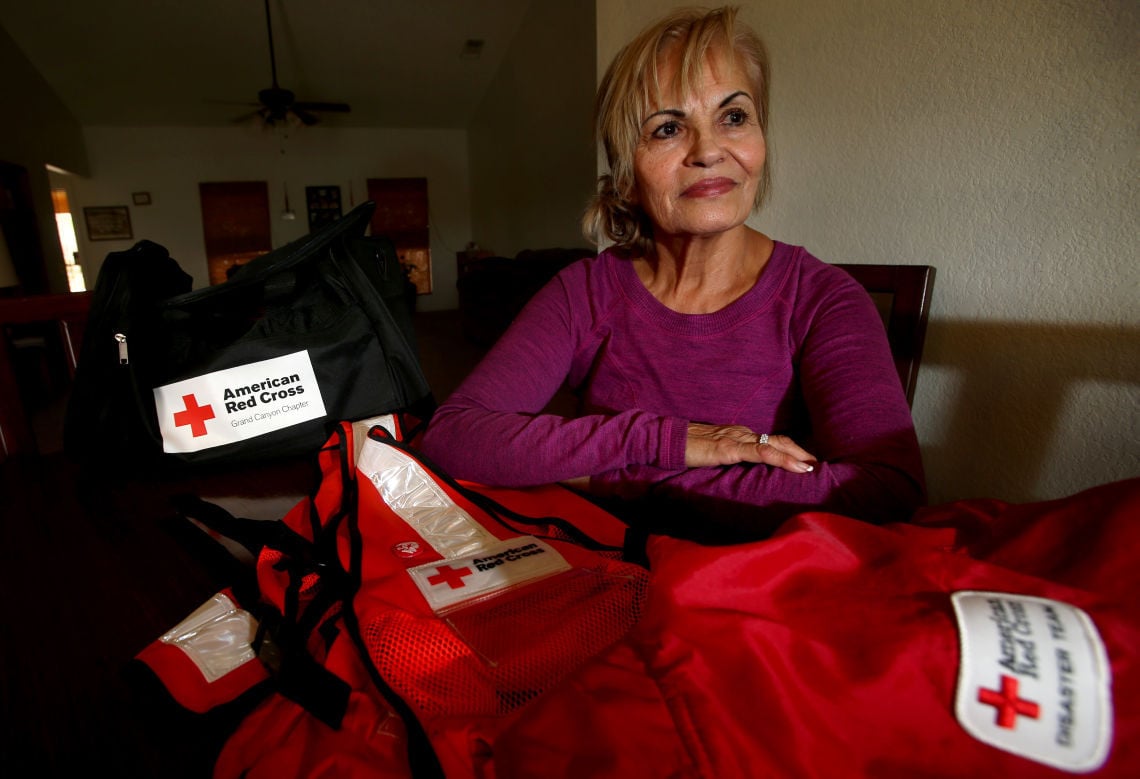When disaster strikes, most people watch it unfold on television. For Lee Chaudoin, disaster means she gets a text from the American Red Cross asking if she is ready to roll.
Each time, the 67-year-old registered nurse has 24 hours to decide whether to take her skills on the road and help victims of floods, hurricanes, tornadoes and wildfires. She has said yes 10 times since she first volunteered with the Red Cross five years ago. And she doesn’t plan to start saying no anytime soon.
“You have somebody give you a hug and cry for happiness because they know somebody cares. That’s fulfillment, that’s my joy,” she said.
When she’s not handing out medication at shelters or helping newly homeless disaster victims find food and clothes, she works part time at Avalon Southwest Health and Rehabilitation, where she has worked for more than two decades after earning her nursing degree from Pima Community College in 1992.
As a disaster nurse, she braved washed-out roads near Harrisburg, Pennsylvania, after Hurricane Irene hit, worked 12-hour shifts for two weeks straight in Long Island, New York, following Hurricane Sandy, and sought out forest dwellers as they escaped wildfires in Colorado.
She also has seen people come together when their world falls apart.
When 12 days of rain in South Carolina a few weeks ago was followed by a tropical storm, Chaudoin saw neighborhoods come together amid the wreckage caused by 5 feet of flooding.
Residents were helping each other empty their homes of destroyed possessions and pile them up in their yards. And thanks to one cheery resident they didn’t have to work on an empty stomach.
“There was this one guy that had three barbecues going, and he was like ‘Come on and have some chicken,’ ” she said. “It’s amazing how people help each other in bad times.”
Chaudoin also has discovered generosity among people with the least to give.
A migrant worker who was stranded by wildfires in Washington this summer tried to give her the last $10 in his wallet, and a woman offered Chaudoin one of her two tacos for lunch. Chaudoin politely turned down both of them, but the memory of those encounters stuck with her.
“People are still good people, and giving, even when they’ve lost everything,” she said.
Despite people pulling together in the face of overwhelming adversity, Chaudoin also has seen how cruel fate can be.
Colorado’s devastating wildfires destroyed the house of a family she met in 2012. Left homeless, the family moved into a relative’s house. But wildfires burned that house to the ground the next year.
“Imagine how devastating that is,” she said as she shook her head inside her home on Tucson’s west side.
But fate is not always so cruel.
Near Lake Chelan in Washington, a wildfire crept up to a trailer housing a terrified family but ultimately left the trailer untouched. Nearby, a propane gas tank outside a factory was covered in red fire retardant dropped by helicopters, an indication of how close the fire got to the factory.
“I just know that some divine grace from somewhere took care of them,” she said.
But Chaudoin also has had her moments of doubt.
Hurricane Irene slammed Harrisburg in 2011, and Chaudoin spent the day in a dangerous neighborhood, followed by a night sleeping in a hotel with wet floors.
“That was kind of traumatizing,” she said. “I was like, ‘Do I really want to do this again?’ But then you think of why you do it. You’re there for the people that need help.”
Chaudoin is one of about a dozen local disaster nurses who volunteer with the Red Cross, said Lynn Sagara, chairwoman of the Southern Arizona Chapter of the American Red Cross.
Nurses play a pivotal role in helping people recover from disasters, said Sagara, who worked as a disaster nurse and recalled relocating patients in Hawaii after a hurricane destroyed the dialysis unit of the local hospital.
“If you take anybody that has health issues, during a disaster those issues are exacerbated, and their access to health care is decreased,” Sagara said.
Volunteering to work in disaster areas twice a year, as Chaudoin does, is not uncommon for Red Cross disaster nurses, she said.
“The demand for nurses in disaster settings is always there,” Sagara said.
How often they are deployed is largely dependent on how available they are, she said.
“A lot of people can’t go,” Chaudoin said. But she has retired from full-time work, and her three children have grown up and moved out. The only arrangements she needs to make are asking her neighbor to look after her dog Harley and notifying her boss.
When asked why she volunteers to help disaster victims, Chaudoin’s answer is simple: “I love people.”
“I like sharing. Even when I cook, I have to feed somebody. I take it to work and have to ask, ‘Are you hungry?’ ” she said.
As a volunteer, Chaudoin doesn’t get paid with money. Instead, she is paid with responses from the people she helps.
“That’s the big paycheck, just knowing you helped somebody. It doesn’t matter if it’s here or 10,000 miles away. We’re all humans.”





